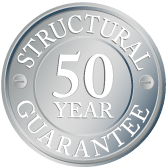Frequently Asked Questions
Our FAQ page about steel frame construction for residential and commercial buildings. Steel frame construction is becoming increasingly popular as a building method due to its numerous advantages, including strength, durability, and energy efficiency. At the same time, there are still many questions that people have about steel frame homes and buildings.
This FAQ page is designed to answer some of the most commonly asked questions and myths about steel frame construction, covering both residential and commercial applications. Whether you're considering building a new home or looking for an alternative building method for your commercial project, this FAQ page will provide you with valuable information and insights into steel frame construction.
MYTHS OF STEEL FRAMES
STEEL FRAMES DON’T PROVIDE VALUE FOR MONEY.
The truth is, there is nothing as valuable as securing your family’s biggest asset. A house frame made from TRUECORE steel provides the ongoing peace of mind you receive from knowing your house frame is 100% termite proof. That’s value for money in anyone’s language. The fact that only TRUECORE steel used in residential house frames comes with a 50 year warranty backed by BlueScope Steel just about says it all.
TERMITES CAN STILL ATTACK THE REST OF YOUR HOME SO STEEL FRAMES DON’T MAKE THAT MUCH DIFFERENCE.
The truth is, there is nothing as catastrophic as the destruction of the primary structure of your house – the frame. Destruction of the frame by termites can be silent and invisible to the eye. Rectification of the damaged frame can require complete replacement of other building components such as plumbing, electrical, plasterboard, skirting, architraves, kitchens, bathrooms, tiling and painting.
TERMITES CAN DAMAGE STEEL FRAMES IN WAYS OTHER THAN EATING THEM.
The truth is, that there is no evidence that termite nests, excrement, heat or moisture can damage a steel frame in any way.
STEEL FRAMES ARE NOISY – POPPING, CREAKING AND GROANING AS THE TEMPERATURE CHANGES.
The truth is, that steel frames are no more noisy than timber frames and there is some evidence to suggest the contrary. Studies conducted by the CSIRO found that “most occupants of homes with steel frames either reported no sound emitted from the frame or said that, if it did, it was no problem”. In fact, some subjects volunteered that there was less noise then previous timber framed houses.
STEEL FRAMES EXPAND MORE WHEN THEY HEAT UP, CAUSING CORNICES TO CRACK.
The truth is, steel framing expands and contracts at rates reasonably similar to those of other building materials, such as cornices and plasterboard. Which means it is highly unlikely there will be cornice cracking problems due to frame movement.
STEEL FRAMES PERFORM WORSE IN A FIRE.
The truth is, steel is non-combustible and does not add fuel to the fire. The elimination of combustible material, such as timber in frames and roofing, can have a tremendous influence on preventing the ignition of a fire. It can also slow the speed of a fire, reduce the intensity and potentially reduce damage and cost caused by fire.

